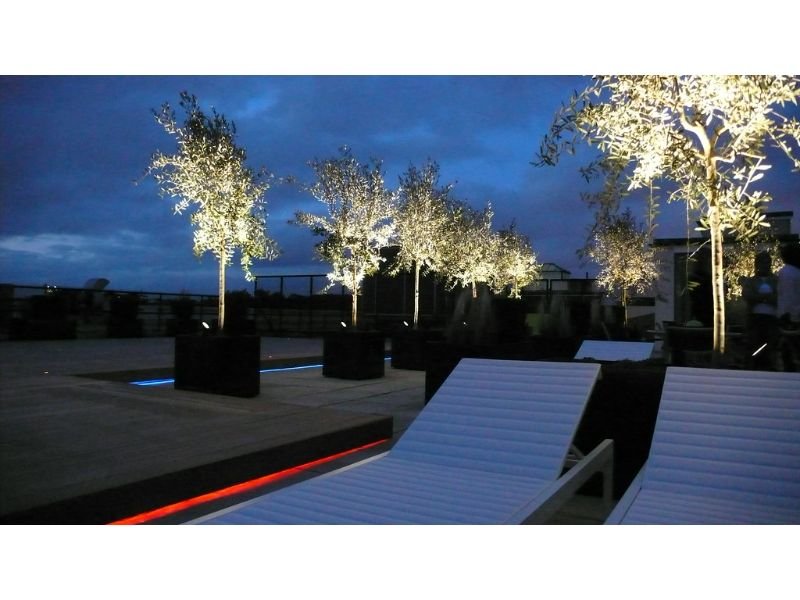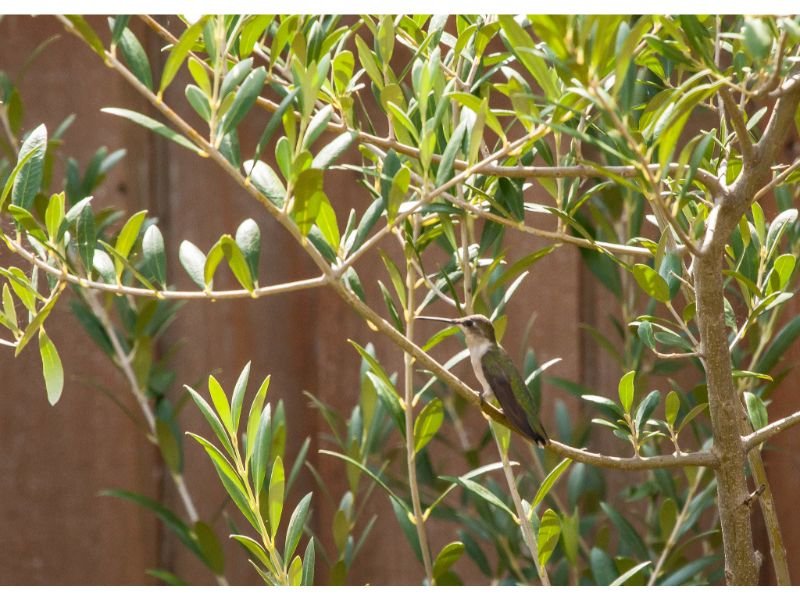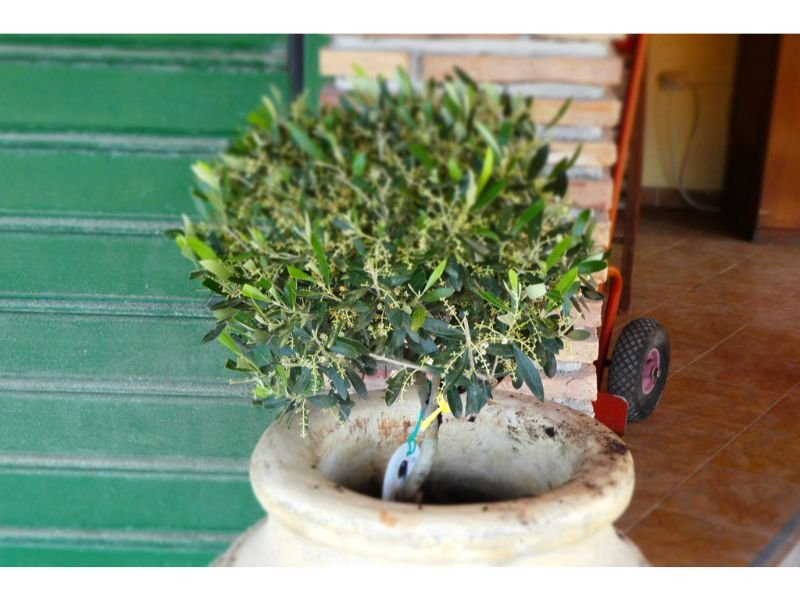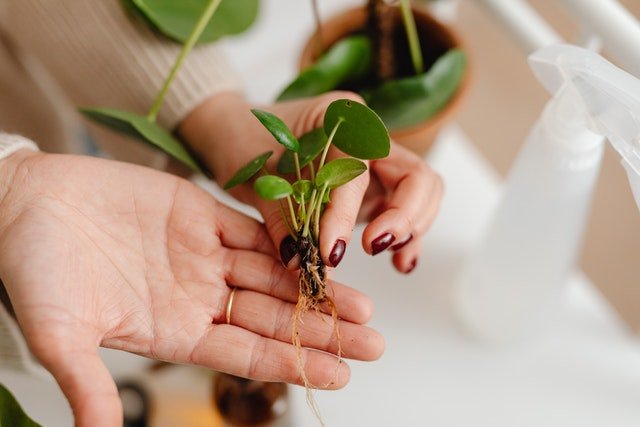If you’re looking to add a touch of Mediterranean charm to your balcony, growing olive trees might just be the perfect solution. Not only do they provide a beautiful aesthetic, but they also offer a variety of health benefits and can even produce your own fresh olives. While it may seem daunting to grow a tree on a small balcony, with the right care and attention, it’s definitely possible. Here’s everything you need to know about growing olive trees on your balcony.

Table of Contents
Benefits of having olive trees on a balcony:
Aesthetic appeal
Olive trees are not only a great source of healthy and delicious olives, but they also have an aesthetic appeal that can add a touch of elegance to any balcony. These trees have a unique and striking appearance that can enhance the overall look and feel of your outdoor space. With their slender trunks and delicate branches, olive trees create a sense of tranquility and sophistication that is hard to match.
Their leaves are a beautiful shade of green that can complement any color scheme, and their small, delicate flowers add a touch of charm and whimsy. Whether you are looking to create a Mediterranean-inspired oasis or simply want to add a touch of natural beauty to your balcony, an olive tree is a great choice. With their timeless beauty and easy maintenance, these trees are sure to be a favorite for years to come.
Fresh air
In addition to their aesthetic appeal, olive trees also have practical benefits for your balcony. These plants are natural air purifiers and can help improve the air quality in your outdoor space. By absorbing pollutants and releasing oxygen, olive trees can create a healthier and more pleasant environment for you to enjoy. So not only will you be adding beauty to your balcony with an olive tree, but you’ll also be improving your overall well-being.
Shade
The tree’s dense foliage can create a natural shade on your balcony, making it a comfortable place to relax even during hot summer days. This can help reduce the need for air conditioning and keep your energy bills low. Additionally, the shade provided by the olive tree can protect your outdoor furniture and plants from the harsh sun, extending their lifespan. So, having an olive tree on your balcony not only adds beauty but also practical benefits that can enhance your outdoor living experience.
Edible fruit
In addition to their aesthetic and practical benefits, olive trees also produce delicious and healthy fruit. Olives are a staple in Mediterranean cuisine and are known for their high levels of healthy fats and antioxidants. By growing your own olive tree on your balcony, you can have access to fresh, organic olives that you can enjoy in a variety of dishes. Whether you use them in salads, pasta dishes, or as a snack, the olives from your balcony tree are sure to be a tasty and nutritious addition to your diet.
Low maintenance
Another benefit of growing an olive tree on your balcony is that they are low maintenance. Olive trees are known for their resilience and can survive in a variety of conditions. They require minimal watering and pruning, making them an ideal plant for those who may not have a green thumb or a lot of time to devote to gardening.
With proper care, an olive tree can thrive on your balcony for many years, providing you with fresh olives and olive oil, as well as a beautiful addition to your outdoor space. So if you’re looking for a low-maintenance plant that offers a variety of benefits, consider adding an olive tree to your balcony.
What to consider before planting olive plants on a balcony:

1. Space: Olive trees can grow quite large, so make sure you have enough space on your balcony to accommodate them.
2. Weight: Olive trees can be heavy, so make sure your balcony can support the weight of the tree and its pot.
3. Sunlight: Olive plants need plenty of sunlight, so make sure your balcony gets enough direct sunlight throughout the day.
4. Soil: Olive trees require well-draining soil, so make sure you use a good-quality potting mix.
5. Watering: Olive plants don’t like to be overwatered, so make sure you water them only when the soil is dry to the touch.
6. Pruning: Olive trees require regular pruning to keep them healthy and to promote fruit production. Make sure you have the time and skills to prune your tree properly.
What are the Requirements for Growing Olive Trees on a Balcony?
1. Adequate sunlight: Olive plants require at least 6 hours of direct sunlight per day, so make sure your balcony receives enough sunlight.
2. Large container: Olive trees need a large container to grow in, at least 24 inches in diameter and 24 inches deep.
3. Well-draining soil: Use a well-draining soil mix that is rich in organic matter and has good drainage.
4. Watering: Olive plants need regular watering, but make sure not to overwater as this can lead to root rot. Allow the soil to dry out slightly between watering.
5. Fertilizer: Olive trees need regular fertilization, especially during the growing season. Use a balanced fertilizer that is high in nitrogen.
6. Pruning: Olive plants need regular pruning to maintain their shape and promote healthy growth. Prune in late winter or early spring before new growth appears.
7. Protection from cold: Olive trees are sensitive to cold temperatures, so protect them from frost and freezing temperatures by covering them with a blanket or moving them indoors during the winter months.
How to Plant and Care for Olive Plants on a Balcony?

To plant and care for olive plants on a balcony, follow these steps:
1. Choose a suitable container: Olive trees need a large container with good drainage holes. The container should be at least 24 inches in diameter and 24 inches deep.
2. Use well-draining soil: Olive plants prefer well-draining soil that is slightly alkaline. Use a mix of potting soil, sand, and perlite to create well-draining soil.
3. Water regularly: Olive trees need regular watering, especially during the growing season. Water the tree deeply once a week, and make sure the soil is moist but not waterlogged.
4. Provide sunlight: Olive plants need plenty of sunlight to grow and produce fruit. Place the container in a sunny spot on your balcony, and make sure the tree gets at least 6 hours of direct sunlight each day.
5. Fertilize occasionally: Olive plants don’t need a lot of fertilizer, but you can give them a boost with a slow-release fertilizer once a year.
6. Prune as needed: Olive trees can be pruned to control their size and shape. Prune in the late winter or early spring before new growth appears.
7. Protect from pests: Olive trees can be susceptible to pests like scale insects and spider mites. Keep an eye out for any signs of infestation and treat with a bar of insecticidal soap if necessary.
With proper care, your olive tree can thrive on your balcony and provide you with fresh olives for years to come.
How to Harvest and Use Olive Trees on a Balcony?

To harvest and use olive trees on a balcony, you will need to ensure that the tree receives enough sunlight and water. You can use a container with good drainage and soil that is rich in nutrients. Prune the tree regularly to promote growth and remove any dead or damaged branches. When the olives are ripe, you can harvest them by hand or using a small rake. Use the olives to make olive oil, or enjoy them as a snack or in recipes.
When is the best time to harvest the olives?
The best time to harvest olives is typically in the late fall or early winter when the olives have reached their full size and have begun to change color from green to black or purple. The exact timing can vary depending on the specific variety of olive and the climate in which it is grown. It is important to harvest the olives at the right time to ensure the best flavor and oil quality.
Conclusion on how to grow an olive tree on a balcony
In conclusion, growing an olive tree on a balcony is possible with the right conditions and care. It is important to choose a suitable variety, provide adequate sunlight and water, and ensure proper drainage. Pruning and fertilizing can also help promote healthy growth and fruit production. With patience and attention, you can enjoy the beauty and benefits of an olive tree right on your balcony.
To sum up, growing an olive tree on a balcony requires careful planning and maintenance. It is essential to choose a dwarf variety that can thrive in a container and provide it with sufficient sunlight, water, and nutrients. Regular pruning and fertilizing can also help ensure healthy growth and fruit production. With the right approach, you can successfully cultivate an olive tree on your balcony and enjoy its beauty and flavor for years to come.

Gardening is my passion and growing plants indoors has always been a stress relief for me. Grow a banana tree in my apartment once (although failed to produce bananas).






